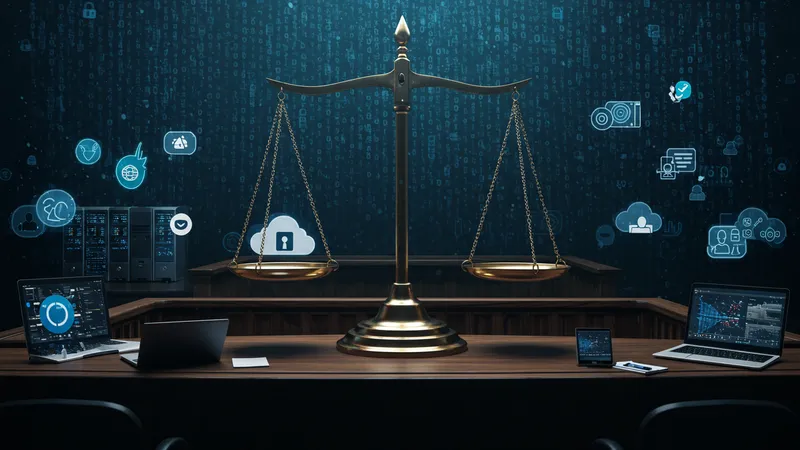

Imagine a world where every second counts, not just for what you do, but for what’s being done to you. The erosion of your personal freedoms might be happening faster than you think.
In today's digital age, protecting your liberties is more crucial than ever. With privacy invasions at an all-time high, understanding these hidden threats is essential to safeguarding yourself from unseen dangers.

Did you know that every interaction you have online can be tracked and sold? That's right—your every click, message, and even voice command is potentially being used to build a detailed profile of your habits. But that’s not even the wildest part...
Recent studies have shown that several devices around your home are listening even when they promise utmost privacy! That coffee machine you just bought? It might be more interested in your conversations than brewing a good cup. But that’s not even the wildest part…
Experts have discovered something alarming hidden in plain sight—something so shocking it has teams of researchers scrambling for solutions. What happens next shocked even the experts...
Your smart devices might be smiling at you from your kitchen counter, but are they as innocent as they seem? Reports suggest that far more is being recorded by our gadgets than we ever consented to. Companies promise peace of mind, but the reality reveals scenarios where intrusions are normalized by our dependence on tech.

Data harvested from our devices goes far beyond improving user experience; it’s about creating a consumer profile that’s sold to the highest bidder. In some cases, entire web-browsing histories are available for corporations to mine for trends and behaviors. But there’s one more twist to consider…
The integration of connectivity in our homes has quietly created an entry point for hackers. If cybercriminals gain access through a single device, the domino effect extends security risks across entire networks. Over 50 million instances of exposed data were reported last year alone. What you read next might change how you see this forever.
Legislation is struggling to keep pace with technological advancements, leaving many loopholes that jeopardize user privacy. While some countries implement stringent data protection laws, enforcement remains inconsistent. This creates an uneven landscape where your location determines your level of digital defense. But that’s not all that’s surprising…
In the digital era, your life's footprint is more than just a trail; it's a roadmap to your identity. Surprisingly, even a minor slip-up can lay bare details you assumed were safe. Your digital shadow is a blueprint not just of your present life but of your past and potential future actions.

There’s a staggering fact: 80% of social media users don’t realize their public posts are visible to potential employers, insurers, and landlords. What you thought was a harmless update years ago could still echo back into your present, influencing decisions on loans, jobs, or travel permissions.
Digital footprints can also paint a picture more vivid than you might believe, combining geolocation data, transactional behavior, and online expressions to offer unprecedented insights. The implications stain more than your current state—they make prediction of your future choices feasible, deepening the profit pool for third-party entities who trade your data like currency.
Perhaps most unsettling is the realization that scrubbing yourself clean of digital traces is nearly impossible. With every 'delete' and 'remove', residues of your previous digital self persist due to data archiving and background backups. But where does this leave us, tethered to technology with a false sense of anonymity? The upcoming truths might be your wake-up call…
While smart devices and corporations draw much attention, another player lurks in the technological shadows—the government. Surveillance initiatives stemming from national security concerns have quietly expanded into our daily lives, often without public discourse or realization of what’s actually at stake.

From airport screenings to traffic cameras, and even digital payments, a mesh of monitoring systems follows citizens far beyond their online posts. These measures, often justified as necessary security protocols, might be infringing on freedoms far more than you'd think. Consider how much of your recent travel was logged; the extent is likely shocking.
Privacy advocates argue that mass surveillance doesn’t equate to enhanced safety. Studies suggest the sheer bulk of collected data often results in the inefficiency of identifying genuine threats. It raises the question—does this cost to personal liberty yield a return that justifies it? The answer might redefine what freedom means to you.
Moreover, the technologies used for surveillance can be unclear even to the most tech-savvy individuals. Encryption technologies and metadata analytics hold such complexity that public oversight is nearly impossible. Yet, the silent acceptance of these practices poses a greater question—how far are you willing to trade your privacy for perceived security? This choice is more crucial than ever…
As privacy erodes and surveillance tightens, digital activism has emerged as a formidable counterforce. Advocates champion transparency and ethical use of data, rallying under a common goal to preserve freedoms increasingly under siege.

Digital activism isn't just about protesting policies—it's about educating the masses. By leveraging social platforms and open-source resources, activists create groundswell movements capable of influencing policy and raising public consciousness. Think of it as the modern-day pamphlet, but significantly more powerful and far-reaching.
These efforts take many forms, from online petitions to global campaigns like #PrivacyMatters. Still, activists often face unique challenges, including censorship and coordinated misinformation. Despite these obstacles, the creation of decentralized networks led by determined individuals persists, ensuring no single entity wields unchecked power.
Behind the scenes, skilled individuals dissect legal jargon and navigate data privacy laws to empower the public with actionable knowledge. It's an ongoing battle, but digital activism instills a communal resilience against infringements on liberty, igniting citizen participation in new, revolutionary ways. But what’s their next move on this digital chessboard? Risks abound…
On the horizon, the next decade promises both advancement in technology and complexity in privacy matters. Each enhancement to digital life influences how freedoms are drawn and redrawn. Ponder this: Could our drive for convenience undermine our foundational liberties?

AI tools integrate deeper into personal and professional spheres, promising efficiency while subtly requesting access to more private data. The balancing act between innovation and privacy oversight becomes a delicate, yet crucial, exercise. Will the masses embrace dependency, or will they prioritize autonomy? Choose wisely from the spectrum of digital offerings.
The backlash against vast data collection is far from a whisper. Legal battles are mushrooming across continents where trust in corporations and governments continues to wane. The quest for technological evolution no longer centers solely on new features but integrates personal rights as a key metric for success.
Navigating this future involves more than choosing tools—it's about rewriting the dialogue of privacy and protection. User advocacy groups underscore this shift, mentoring individuals on proactivity instead of reactionary responses. As we grapple with these emerging landscapes, how will society anchor itself to principles of liberty in an ever-connected world? What unfolds next is a quest you’ll want to follow...
Consent sits at the forefront of digital interaction, dictating the terms of engagement between users and platforms. What users grant permission for often surpasses initial grasp, embedding deeper into their online engagements than ever before.

The notion of 'clicking agree' has morphed into something complex—nestled within fine print are clauses that stretch the boundaries of consent. Have you ever wondered what lies within those Terms & Conditions you skipped over? It’s a daunting landscape of negotiation far less straightforward than it seems.
It becomes crucial to understand the implications of digital consent as more devices connect to the web. 'Silent recordings' and 'data packets' are terms masking potential privacy negotiations that weren’t made clear. Industries are often quiet about these spectrums of potential user surveillance.
Case studies reveal mishaps where companies overreach, turning user agreement into unrestricted access. But how do individuals reestablish balance and regain control? It's a narrative currently underway, a slow tide turn toward transparency and more stringent consent policies. New developments could redefine agreements in groundbreaking ways…
Do you own what you store digitally? It’s a pressing question without a straightforward answer. The lines blur as to who truly owns and controls personal data—individuals or the platforms hosting them. This ambiguity adds another layer to the protection of liberties.

Curiously, data fiefdoms have emerged wherein tech giants assert dominion over user-generated data. This claim often chafes with public sentiment, where ownership is often assumed to be individualistic. And yet, the reality is starkly different when examining usage policies and data rights.
Startlingly, users may unwittingly waive ownership rights through simple account creation. When data is stored on cloud platforms, ownership exchanges hands seamlessly, rarely to the consumer's advantage. This prompts an increasing rally for change, stressing the importance of user-controlled data storage to maintain genuine ownership.
Legally, understanding the nuances of data ownership could mean the difference between privacy reclamation or relinquishing potential power. It presents a dire call for stricter legislative governance. Where this conversation leads next could redefine what's perceived as yours in the digital world. Prepare for revelations that connect to your very identity…
With AI systems making headlines, there’s a lurking question few address—can these systems truly operate without infringing on personal liberty? Their self-governance promises efficiency, yet the integration with human environments mandates caution.

AI systems rely on comprehensive data to finetune predictions and responses, potentially tapping into personal depths previously unconsidered. However, their hunger for information might risk what it means to retain personal space in a congested digital landscape.
The dialogue around AI ethics intensifies, noting inconsistencies in regulatory measures that render individuals vulnerable to unintended exploitation. With AI controlling everything from your smart thermostats to daily productivity tools, are we ceding too much to entities we understand so little?
Despite their reliance on algorithms, can AI respect the intangible element of human individuality? As these technologies continue to mesh with our routines, a discussion emerges about enhancement without the compromising of core personal freedoms. How ultra-connected living balances with autonomy might surprise you…
In the arena of technological innovation, privacy often feels left on the sidelines. Innovators push boundaries, but the preservation of privacy requires an equally vigorous fallback. Where do these paths intersect, and more importantly, where should they diverge?

The push-pull dynamic between technological marvels and inherent privacy risks underlies much of modern discourse. Often, the hand doesn’t just extend—it's all too eager to delve into every nook and cranny of private life, seeking optimization at possibly unacceptable costs.
Some argue for innovation-led progression under careful watch was countered by staunch defenders of privacy-first approaches. What's alarming is how often these conversations neglect to factor the account of the ordinary user by tech oversight bodies.
Can society cultivate a tech-savvy future without sacrificing personal sanctums? Professionals worldwide are shaping this debate towards a unified purpose: pairing groundbreaking technology with inviolable privacy principles. As this unfolds, you’ll realize why keeping these dualities in check is paramount…
While liberty faces its trials from overt surveillance, a covert threat looms large—cybersecurity. Bad actors continually evolve, and the stakes grow with every breach and leak exposing vulnerabilities once presumed secure.

Your personal information is the currency of the dark web, traded in unthinkable numbers. This hidden marketplace underscores the importance of fortifying defenses where data swarms in troves. Cyberattacks are not mere statistics; they translate into real-world consequences altering the digital terrain.
Despite streamlined defense systems, the threat landscape morphs incessantly, keeping tech guardians countless steps behind. It’s not just about safeguarding data but maintaining trust and integrity within digital life. If security falters, the resultant insecurity ripples outward, enveloping sectors beyond your screen.
The horizon features artificial intelligence in cybersecurity, enhancing adaptive defenses. Yet, the omnipresence of algorithms begs an underlined question—whose security are we reinforcing, and why? As solutions become more advanced, ponder where oversight aligns amidst genuine vulnerability. The path to beefed-up defenses might reveal more than expected…
How do you carve a haven of control amidst a realm thriving on data? To regain dominion over personal data may seem an uphill battle but isn't it a cause worth chasing?

It begins with conscious digital practices—encryption, awareness of cyber hygiene, and diligent scrutiny of privacy settings can all contribute. Understanding the future of liberty involves more than reading the fine print—it’s about active participation in protecting oneself from unseen shackles.
Amidst clamors of freedom, a dialogue ensues about rectifying ambiguities in legal protections. Your digital autonomy has been, in essence, your unawakened power. As software and apps grow indispensable, so too should your comprehension of how they integrate with liberties.
This path necessitates engagement and education—an invitation for individuals to reshape their interaction with the digital matrix for better, safer cohabitation. The examination of true freedom in this arena underscores a takeaway: a call to break barriers envelops more than temporal struggles but a fight triumphing over technological conformism.
In this fast-evolving digital age, safeguarding your liberties is no longer a passive endeavor. It's an active pursuit, demanding vigilance and empowerment. Understanding these issues is the first step to reclaiming control and navigating your digital life more securely.

Our journey through these insights has highlighted one undeniable truth: the choices you make today shape the digital world you'll live in tomorrow. Digital empowerment isn't a mere option; it's a necessity for safeguarding personal freedoms amidst the ceaseless evolution of technology.
Encouraging the spread of this crucial comprehension is paramount. Share these insights with others, spark conversations within your circles, and advocate for transparency and ethical practices. By doing so, you become an active participant in crafting a digital world that respects and protects our liberties every second.